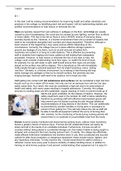Essay
Unit 37 - Understanding Business Ethics M1 D1
- Institution
- PEARSON (PEARSON)
REWARDED DISTINCTION Tesco evaluation M1 - assess how a selected business could improve the ethics of their operations D1 - evaluate the impact of a selected business’s ethical behaviour on stakeholders and the business.
[Show more]




